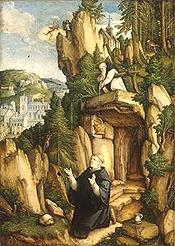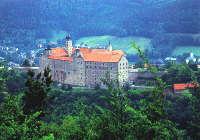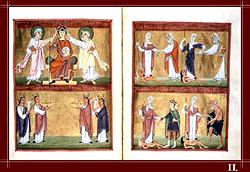I was born and raised in Germany and moved to the US when I was 19 years old.
 As a child in Germany, I always had a feeling of innocence, protection and safety. The repetitive cycles of the customs and traditions of the seasons gave me a feeling of assurance about continuance of life.
As a child in Germany, I always had a feeling of innocence, protection and safety. The repetitive cycles of the customs and traditions of the seasons gave me a feeling of assurance about continuance of life.
I could literally start my childhood story by saying "Once upon a time I used to live behind the rolling hills of Franconia, tucked away in a small village." There was almost a fairy-tale innocence to that life.
There is a nostalgic, almost romantic, atmosphere in places that are rich in traditions, history and culture. It awakens the archetypes of heroes and maidens, kings and queens and kingly knights whose purpose is to fight evil with the honorable motive of a pure heart. This pure heart – required for u2018servant-hood' instead of “ruling” – resonates in the mythology, folk-songs, fairy tales and poems of my native land.
As a child I always wanted to be a princess or a queen, because I'd seen paintings and statues of them everywhere. One could not escape history. The remnants of aristocratic rule are visible in every town and city in Germany.
 Bamberg, a city about 20 kilometers from where I grew up, is over 1000 years old. Its German-Frankonian King was Heinrich II (1002 AD), who later became the Protector and Emperor of the Holy Roman Empire (1014 AD). His stone coffin is still displayed in the cathedral he had built, where he lies with his wife, Kunigunde. Picture relics displaying their life stories are carved on every side of the coffin.
Bamberg, a city about 20 kilometers from where I grew up, is over 1000 years old. Its German-Frankonian King was Heinrich II (1002 AD), who later became the Protector and Emperor of the Holy Roman Empire (1014 AD). His stone coffin is still displayed in the cathedral he had built, where he lies with his wife, Kunigunde. Picture relics displaying their life stories are carved on every side of the coffin.
Local folklore is rich with stories about her life. She is depicted as a caring "mother" for her citizens and as a woman who possessed great wisdom. Heinrich and Kunigunde remained childless, which marked the ending of the Ottonian dynasty.
 Kingship, which goes back to ancient times, has always been seen as a connection between the earthly realm and the heavenly realm. As I researched the origin of kingship, I found the underlying theme is that of servant-hood: a guardian and protector over the land and its people, one who has its best interest in his heart.
Kingship, which goes back to ancient times, has always been seen as a connection between the earthly realm and the heavenly realm. As I researched the origin of kingship, I found the underlying theme is that of servant-hood: a guardian and protector over the land and its people, one who has its best interest in his heart.
I often felt a sort of reverence when I would visit a castle or fortress. I couldn’t help but be mesmerized by the symbols in paintings, tapestries and statues that told the stories of Percival and the Holy Grail, the trials and tribulation to save Christendom, the times of the troubadours and the battles and wars fought in the name of the King.
I felt the same when visiting a small chapel in the country or a big cathedral in a city. Some of these buildings, over 1000 years old, echo stories of their patriarchs and matriarchs in the artful paintings on the ceilings and through the saintly figures carved in wood and stone.
 The area I am from was settled by Benedictine and Cistercian monasteries and had estate manors that still belong to the local diocese that was under the jurisdiction of an apt or aptness. The monks or the nuns were devoted to education and scholarly studies. Many of them also farmed, but the majority of them took it as their responsibility to educate the elite and later the commoner's children.
The area I am from was settled by Benedictine and Cistercian monasteries and had estate manors that still belong to the local diocese that was under the jurisdiction of an apt or aptness. The monks or the nuns were devoted to education and scholarly studies. Many of them also farmed, but the majority of them took it as their responsibility to educate the elite and later the commoner's children.
I attended a boarding school when I was a teenager that was run by the Franciscan nuns. The convent housed about 50 nuns and over 130 girls. If you ever wondered what angels sounded like, then the singing voices of the nuns are close to it. They still give me a mysterious chill down my spine when I think of their voices.
I am mentioning the clergy because their influence was so visible where I grew up. The clergy has always played a major role in Germany’s history. The prince-bishops did not only have religious powers, but also secular powers, and were obedient to the king.
I always liked the monks, though. They are not only smart but also funny. Maybe that's why they were good at brewing beer. Many of them were scribes, craftsmen and great scholars, and were the u2018guardians' over the arts of science and many ancient manuscripts. Some of them made great contributions to mathematics, physics and astronomy.
 The knowledge they possessed was a sign of great power. Most of them encouraged studies of different arts amidst a flourishing spirit of learning.
The knowledge they possessed was a sign of great power. Most of them encouraged studies of different arts amidst a flourishing spirit of learning.
As a child and young woman, I could not but wonder how life was like and what it meant to people that lived during those times.
In the early elementary school grades we had a subject called “Heimatkunde,” where our teacher would take us out into the country and visit local important historical sights and teach us about nature. I remember one teacher in particular, Herr Marx (not to be confused with the founder of Marxism). He was an older gentleman from Prussia, and my fourth-grade teacher. I learned a lot from him.
We would hike through the fields and woods to learn about the local flowers and plants. We'd look for fossils, and he’d tell us the names of every hill and mountain. He also took us to a place that used to be a village that perished with the deadly plague during the Middle Ages. And he would greatly go into the details of the landlords of the "Scherenburg."
All of it fascinated me. I couldn't help but activate my imagination when Herr Marx would tell us of the legends of how knighthood got started and how the knights became corrupt. I would try to imagine what it used to look like 500 or even 900 years ago and how people dressed and looked like back then in their armors and fine frocks.
 But the most intriguing question to me has always been how did this get started? What did all the ceremonies and traditions really mean?
But the most intriguing question to me has always been how did this get started? What did all the ceremonies and traditions really mean?
There are many hardships the people had to endure over nine centuries. This includes the many attacks by other dynastic successions, the brutal peasant wars and the separation of Protestant and Catholic that started the Thirty Year’s War. The atrocities committed during these times range from horrible tortures to persecutions and starvations. I am often surprised that people survived all these cruelties, not to forget the loss of lives in the 20th Century.
With age comes maturity and I have since learned that man will always have to deal with the elements of good and evil within his own nature.
The desire of seeing purity of heart in the leadership of people's Kings and Queens is expressed in many stories and legends that showed their divine strength in obedience and love for God, earthly power through bravery and courage, and intelligence through wisdom. These were symbolic expressions of a pure heart that came from a higher source than the person's own earthly desires.
These stories told of prosperity and well-being for the land and its people. The Bible itself is full of these stories.
 In many paintings in Germany, the wooden reed shown in the hands of saints, angels and kings is a sign of authority. It is also seen in the royal scepter held by kings. It is the humble sign of servant-hood bestowed upon a person of leadership. It is not to rule, but to serve and govern.
In many paintings in Germany, the wooden reed shown in the hands of saints, angels and kings is a sign of authority. It is also seen in the royal scepter held by kings. It is the humble sign of servant-hood bestowed upon a person of leadership. It is not to rule, but to serve and govern.
All these characteristics and symbols and stories have lost their meaning nowadays, because we no longer believe in kings and queens. Their spiritual meaning has been lost over time.
Everyone's history can teach the lesson of what happens when a dignified position to serve the people and its land gets abused through wrong motives that lack the insight of wisdom. And only the application of wisdom can bring forth the best in people.
My personal experience growing up with this history has given me glimpses into a rich and colorful past that show the downfall of each era through greed and corruption by their leadership. The ruins of the past were my backyard.
In ancient times the holder of such a position of "servant-hood" was usually a learned man who was able to abandon his narcissism and desire to have power and control over others.
If any man can re-connect to the true meaning of heroism, it will certainly not include the show of power through force and might. He would rule over chaos with wisdom, a kingly act indeed. He would bring order to chaos.
History is a wonderful tool to use for people of wisdom. It can teach wise lessons to anyone who is willing to listen. When I read of all the ancient empires that rose to great fame only to have a tragic ending, I found there are aspects these nations had in common besides a big – or the biggest – territory.
 These aspects are arrogance, disregard for human life (slavery and murder), and an attitude to be a "ruler" rather than a "servant" over the land and people that was given in their care.
These aspects are arrogance, disregard for human life (slavery and murder), and an attitude to be a "ruler" rather than a "servant" over the land and people that was given in their care.
October 23, 2003







